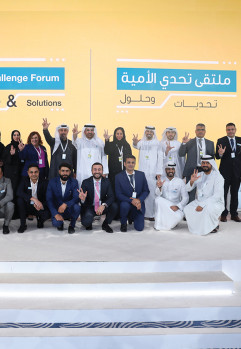Six Basic Pillars to Eliminate Illiteracy
At the conclusion of the inaugural Literacy Challenge Forum, participants adopted several recommendations aimed at eliminating illiteracy in the Arab world.
At the conclusion of the inaugural Literacy Challenge Forum, participants adopted several recommendations aimed at eliminating illiteracy in the Arab world.
As part of the recommendations, the participants came up with six pillars that are key in the campaign against illiteracy; namely:
1. Reading is an essential pillar for achieving sustainable development, and empowerment of individuals to exercise their various rights.
2. Literacy programs can promote equality.
3. Learning lessons and benefiting from international outputs and assessments in the field of literacy and adult education.
4. Promoting the national and regional framework for the implementation of the decisions of the Belém Conference 2009, by following the vision and methodology for lifelong learning which includes policy development, governance, financing, participation and equality.
5. Adopting flexible and alternative education pathways to help children return to school in the conflict–affected countries of the Arab world.
6. Harnessing information technology tools to expand the use and participation of adult education programs.
To achieve the above, the Forum resolved on two mechanisms. The first one is contemporary vision and concepts for literacy and adult education and learning which are to be achieved through a renewed literacy program that goes beyond reading and writing and reviewing laws to promote continuous adult learning. Focus will also be put on promoting flexible opportunities for alternative education, and facilitating the means of recognition and academic accreditation for competencies and qualifications gained in formal and informal educational programs.
The second mechanism focuses on policies and programs that can be achieved through adopting a multisectoral approach, ensuring a high level of quality at all levels, preparing national standards and indicators to measure the performance of teachers, mentors and service providers.
The participants also proposed the recognition of the civil society and the role it plays in raising awareness, encouraging the use of information and communications technology, and the development of national systems to collect, analyze and share data on illiteracy levels, including the classification of marginalized groups.
The Forum called on all regional and international partners to provide support at the national and regional levels to promote the campaign on literacy and adult education.
Additionally, international partners were urged to support the governments to build competencies in adopting contemporary policies, trends and programs in adult education in the context of lifelong learning, and encourage Arab countries to take advantage of the inputs of the UNESCO Literacy Strategy for Youth and Adult Literacy (2020-2025).








